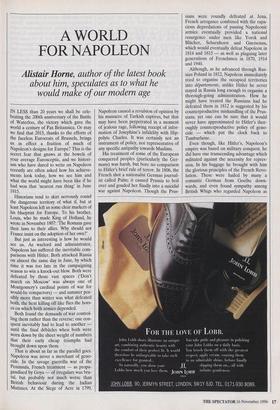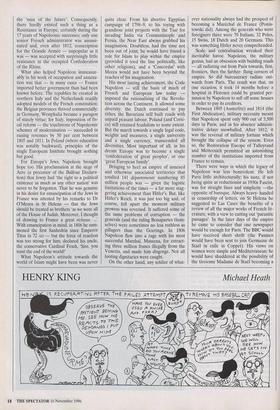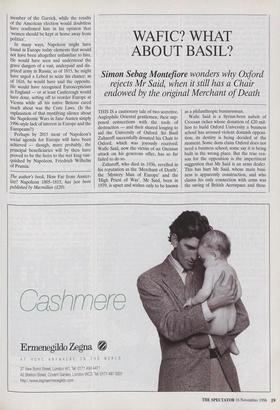A WORLD FOR NAPOLEON
Alistair Home, author of the latest book about him, speculates as to what he would make of our modem age
IN LESS than 20 years we shall be cele- brating the 200th anniversary of the Battle of Waterloo, the victory which gave the world a century of Pax Britannica. Or may we find that 2015, thanks to the efforts of the faceless Eurocrats of Brussels, brings us in effect a fruition of much of Napoleon's designs for Europe? This is the secret fear that gnaws at the bowels of your average Eurosceptic, and we histori- ans who have dared to write on Napoleon recently are often asked how his achieve- ments look today, how we see him and what the world might have been like if he had won that 'nearest run thing' in June 1815.
Historians tend to skirt nervously round the dangerous territory of what if, but at least Napoleon left us some clear markers of his blueprint for Europe. To his brother, Louis, who he made King of Holland, he wrote in November 1807: 'The Romans gave their laws to their allies. Why should not France insist on the adoption of her own?'
But just as interesting is how he would see us. As warlord and administrator, Napoleon has suffered the inevitable com- parisons with Hitler. Both attacked Russia on almost the same day in June, by which time it was too late in the campaigning season to win a knock-out blow. Both were defeated by those vast spaces (Don't march on Moscow' was always one of Montgomery's cardinal points of war for would-be conquerors) — and summer pos- sibly more than winter was what defeated both, the heat killing off like flies the hors- es on which both armies depended.
Both found the demands of war control- ling them rather than the reverse; one con- quest inevitably had to lead to another until the final debacles when both were worn down by the sheer weight of numbers that their early cheap triumphs had brought down upon them.
That is about as far as the parallel goes. Napoleon was never a merchant of geno- cide. In the savage guerrilla war of the Peninsula, French treatment — as propa- gandised by Goya — of irregulars was bru- tal, but probably not much worse than British behaviour during the Indian Mutinies. At the Siege of Acre in 1799, Napoleon caused a revulsion of opinion by his massacre of Turkish captives, but that may have been perpetrated in a moment of jealous rage, following receipt of infor- mation of Josephine's infidelity with Hip- polyte Charles. It was certainly not an instrument of policy, nor representative of any specific antipathy towards Muslims.
His treatment of some of the European conquered peoples (particularly the Ger- mans) was harsh, but bore no comparison to Hitler's brief rule of terror. In 1806, the French shot a nationalist German journal- ist called Palm; it caused Prussia to boil over and goaded her finally into a suicidal war against Napoleon. Though the Prus- sians were roundly defeated at Jena, French arrogance combined with the rapa- cious depredations of passing Napoleonic armies eventually provided a national resurgence under men like Yorck and Blucher, Scharnhorst and Gneisenau, which would eventually defeat Napoleon in 1814 and 1815 — as well as plaguing later generations of Frenchmen in 1870, 1914 and 1940.
Although, as he advanced through Rus- sian Poland in 1812, Napoleon immediately tried to organise the occupied territories into departements, unlike Hitler he never stayed in Russia long enough to organise a thorough-going administration. How he might have treated the Russians had he defeated them in 1812 is suggested by his counterproductive mishandling of the Prus- sians; yet one can be sure that it would never have approximated to Hitler's thor- oughly counterproductive policy of geno- cide — which put the clock back to Tamburlaine.
Even though, like Hitler's, Napoleon's empire was based on military conquest, he did have one transcending advantage which militated against the necessity for repres- sion. In his baggage he brought with him the glorious principles of the French Revo- lution. These were hailed by many a romantic German from Goethe down- wards, and even found sympathy among British Whigs who regarded Napoleon as the 'man of the future'. Consequently, there hardly existed such a thing as a Resistance in Europe, certainly during the 17 years of Napoleonic successes; only one senior French administrator was assassi- nated and, even after 1812, conscription for the Grande Armee — unpopular as it was — was accepted with surprisingly little resistance in the occupied Confederation of the Rhine.
What also helped Napoleon immeasur- ably in his work of occupation and annexa- tion was that — in many cases — France imported better government than had been known before. The republics he created in northern Italy and the Netherlands readily adopted models of the French constitution; the Belgian provinces thrived commercially; in Germany, Westphalia became a paragon of stately virtue; for Italy, imposition of fis- cal reform — the touchstone of Napoleonic schemes of modernisation — succeeded in raising revenues by 50 per cent between 1805 and 1811. In Poland (where education was notably backward), principles of the single European Institute brought nothing but good.
For Europe's Jews, Napoleon brought hope too. His proclamation at the siege of Acre (a precursor of the Balfour Declara- tion) that Jewry had 'the right to a political existence as much as any other nation' was never to be forgotten. That he was genuine in his desire for emancipation of the Jews in France was attested by his remarks to Dr O'Meara in St Helena — that the Jews should be treated as brothers 'as we were all of the House of Judah. Moreover, I thought of drawing to France a great richesse. With emancipation in mind, in 1806 he sum- moned the first Sanhedrin since Emperor Titus in 72 AD — but the force of reaction was too strong for him; declared his uncle, the conservative Cardinal Fesch, 'Sire, you want the end of the world!'
What Napoleon's attitude towards the world of Islam might have been was never quite clear. From his abortive Egyptian campaign of 1798-9, to his toying with grandiose joint projects with the Tsar for invading India via Constantinople and Persia, the Near East always grabbed his imagination. Doubtless, had the time not been out of joint, he would have found a role for Islam to play within the empire (provided it toed the line politically, like other religions), and a 'Concordat' with Mecca would not have been beyond the reaches of his imagination.
His most lasting achievement, the Code Napoleon — still the basis of much of French and European law today imposed the rationalising of the Revolu- tion across the Continent. It allowed some diversity: the Dutch continued to pay tithes, the Bavarians still built roads with unpaid peasant labour, Poland (and Corsi- ca) still retained feudalism to some extent. But the march towards a single legal code, weights and measures, a single university and a single currency, transcended all diversities. Most impoftant of all, in his dream Europe was to become a single `confederation of great peoples', or one `great European family'.
Bringing to heel an empire of annexed and otherwise associated territories that totalled 141 departements numbering 85 million people was — given the logistic limitations of the times — a far more stag- gering achievement than Hitler's. But, like Hitler's Reich, it was just too big and, of course, fell apart the moment military prowess was reversed. It suffered some of the same problems of corruption — the generals (and the ruling Bonapartes them- selves) were sometimes no less ruthless as pillagers than the Goerings. In 1806 Napoleon flew into a rage with his most successful Marshal, Massena, for extract- ing three million francs illegally from the Venezia, and made him disgorge. Not all looting dignitaries were caught.
On the other hand, any soldier of what- ever nationality always had the prospect of becoming a Marechal de France (Ponia- towski did). Among the generals who were foreigners there were 70 Italians, 32 Poles, 15 Swiss, 18 Dutch and 20 Germans. This was something Hitler never comprehended.
Scale and centralisation wreaked their inevitable havoc. Napoleon, the military genius, had an obsession with building roads — all radiating out from Paris towards, first, frontiers, then the farther- flung corners of empire. So did bureaucracy radiate out- wards from Paris. The result was that, on one occasion, it took 14 months before a hospital in Florence could be granted per- mission by Napoleon to sell off some houses in order to pay its creditors.
Between 1805 (Austerlitz) and 1814 (the First Abdication), military necessity meant that Napoleon spent only 900 out of 3,500 days in Paris, and in his absence adminis- trative delays snowballed. After 1812, it was the reversal of military fortune which brought the collapse of the system. Even so, the Restoration Europe of Talleyrand and Metternich permitted an astonishing number of the institutions imported from France to remain.
There were ways in which the legacy of Napoleon was less benevolent. He left Paris little architecturally; his taste, if not being quite as reductionist as 1930s Fascist, was for straight lines and simplicity —the opposite of baroque. Always heavy- handed in censorship of letters, on St Helena he suggested to Las Cases the benefits of a review of all the major works of French lit- erature, with a view to cutting out 'parasitic passages'. In the later days of the empire he came to consider that one newspaper would be enough for Paris. The BBC would have received short shrift (the Paxmen would have been sent to join Germaine de Stael in exile in Coppet). His views on women were simple and Mediterranean: he would have shuddered at the possibility of the tiresome Madame de Stael becoming a member of the Garrick, while the results of the American election would doubtless have confirmed him in his opinion that `women should be kept at home away from politics'.
In many ways, Napoleon might have found in Europe today elements that would not have been altogether unfamiliar to him. He would have seen and understood the grave dangers of a vast, underpaid and dis- prized army in Russia; as of 1815, he might have urged a Lebed to seize his chance; as of 1816, he would have said the opposite. He would have recognised Euroscepticism in England — or at least Castlereagh would have done, setting off to reorder Europe at Vienna while all his native Britons cared much about was the Corn Laws. (Is the explanation of that mystifying silence about the Napoleonic Wars in Jane Austen simply 1996–style lack of interest in Europe and the Europeans?) Perhaps by 2015 most of Napoleon's social agenda for Europe will have been achieved — though, more probably, the principal beneficiaries will by then have proved to be the heirs to the wet king van- quished by Napoleon, Friedrich Wilhelm of Prussia.
The author's book, How Far from Auster- litz? Napoleon 1805-1815, has just been published by Macmillan (.E20).




















































































 Previous page
Previous page